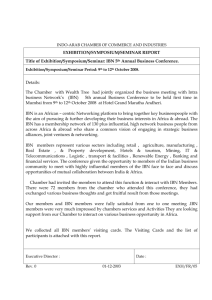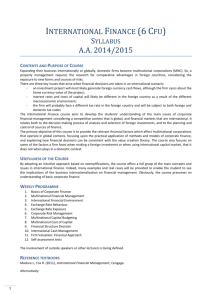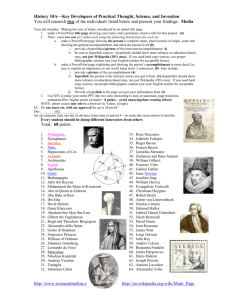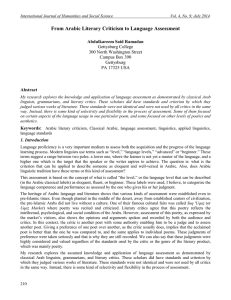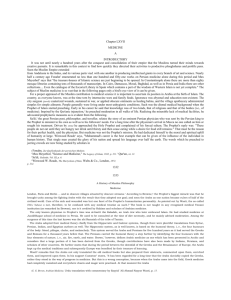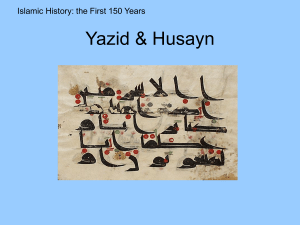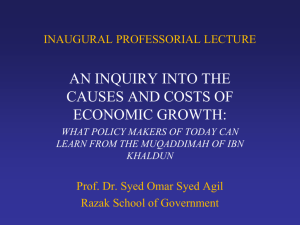The pace of global business interactions continues to accelerate
advertisement
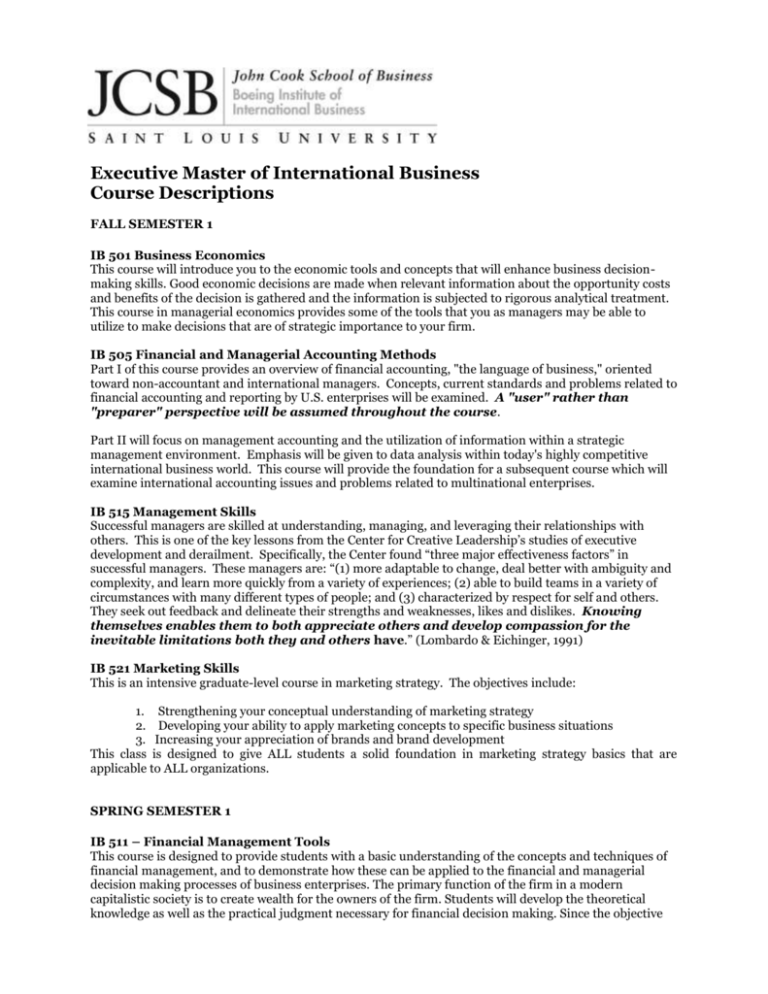
Executive Master of International Business Course Descriptions FALL SEMESTER 1 IB 501 Business Economics This course will introduce you to the economic tools and concepts that will enhance business decisionmaking skills. Good economic decisions are made when relevant information about the opportunity costs and benefits of the decision is gathered and the information is subjected to rigorous analytical treatment. This course in managerial economics provides some of the tools that you as managers may be able to utilize to make decisions that are of strategic importance to your firm. IB 505 Financial and Managerial Accounting Methods Part I of this course provides an overview of financial accounting, "the language of business," oriented toward non-accountant and international managers. Concepts, current standards and problems related to financial accounting and reporting by U.S. enterprises will be examined. A "user" rather than "preparer" perspective will be assumed throughout the course. Part II will focus on management accounting and the utilization of information within a strategic management environment. Emphasis will be given to data analysis within today's highly competitive international business world. This course will provide the foundation for a subsequent course which will examine international accounting issues and problems related to multinational enterprises. IB 515 Management Skills Successful managers are skilled at understanding, managing, and leveraging their relationships with others. This is one of the key lessons from the Center for Creative Leadership’s studies of executive development and derailment. Specifically, the Center found “three major effectiveness factors” in successful managers. These managers are: “(1) more adaptable to change, deal better with ambiguity and complexity, and learn more quickly from a variety of experiences; (2) able to build teams in a variety of circumstances with many different types of people; and (3) characterized by respect for self and others. They seek out feedback and delineate their strengths and weaknesses, likes and dislikes. Knowing themselves enables them to both appreciate others and develop compassion for the inevitable limitations both they and others have.” (Lombardo & Eichinger, 1991) IB 521 Marketing Skills This is an intensive graduate-level course in marketing strategy. The objectives include: 1. Strengthening your conceptual understanding of marketing strategy 2. Developing your ability to apply marketing concepts to specific business situations 3. Increasing your appreciation of brands and brand development This class is designed to give ALL students a solid foundation in marketing strategy basics that are applicable to ALL organizations. SPRING SEMESTER 1 IB 511 – Financial Management Tools This course is designed to provide students with a basic understanding of the concepts and techniques of financial management, and to demonstrate how these can be applied to the financial and managerial decision making processes of business enterprises. The primary function of the firm in a modern capitalistic society is to create wealth for the owners of the firm. Students will develop the theoretical knowledge as well as the practical judgment necessary for financial decision making. Since the objective 2 criterion for financial decisions is value maximization, the course should emphasize how the market values both financial assets and real assets. The specific topics that should be covered include, but are not limited to, maximization of shareholders wealth, time value of money, valuation of financial assets, capital budgeting, risk and return relationship, and cost of capital. IB 514 International Business Environment Business is increasingly global to the point where almost every business is touched to some extent by international business – imports, exports, foreign direct investment, international service agreements, licensing agreements, international competition, and the international business practices of your domestic competition. This course tries to analyze international business problems and challenges from an interdisciplinary and cross-functional approach; integrating financial, operational, political, cultural and strategic aspects. The course attempts to develop analytical skills to understand the conceptual framework of global business issues and apply them to real cases and examples. IB 525 International Trade Policy This course focuses on current issues in international economics including currency determination, global linkages and crises and international trade. It emphasizes how to apply economic intuition, rather than complex economic models, and is designed to answer important questions that businesses face today. The central focus is to take important international economic events and analyze how they impact the international business environment. More specifically, we examine important factors that determine and affect an American company’s decision to invest abroad; for instance how has America’s recession impacted other countries and what are the effects of currency movements on profitability of American companies abroad? We begin with an examination of the financial crisis and its impact on the world economy. We investigate: Is this Time Different? The US crisis is yet another financial crisis, and it is important to understand what caused it as well as its effect on both the domestic and world economy. Why has this developed into a Global Financial crisis, and how does this affect investment and trade decisions. We then focus on contemporary problems with the World economy, particularly the growing US current account deficit and its implications. Can the US through importing continue to be the world’s consumer? If not, what does this imply about exchange rates, interest rates, trade and investment? The class then explores other world vulnerabilities such as the recent oil shock, the problems with Europe and the Euro as well as the increasing reliance of the world on one or two engines of growth (the US. and China). How does one currency affect the trade, interest rates and investment of its member countries? We also explore popular trade misconceptions, particularly causes of current account imbalances and competitiveness; for instance, are current account deficits a sign of strength or weakness. The readings shows that US current deficits, the largest in the world, are a source of concern, but do not necessarily imply harm or weakness. Does borrowing for emerging countries make them more vulnerable to speculative attacks, currency crisis and default? Are lender countries therefore safe bets? What economic signals/variables are important in determining good macroeconomic and investment health? What are factors are important in determining long-run growth and productivity? How do they affect the profitability of international investment. The readings and class discussion will demonstrate that many current books and articles exaggerate the harms of international trade and its effects on US income and employment. We further study how trade influences jobs, manufacturing, and income. Robert’s book on the case for Free Trade is also discussed. Causes of the Asian crisis, the emergence of China and Globalization will round out the semester. IB 562 - Int'l Mktg Research/Analysis (2) This course will cover state-of-the-art computer modeling techniques and their application in real-world business situations. Besides the tools and techniques, the class will also focus on issues that effect data procurement and analysis. 3 SUMMER SEMESTER 1 IB 568 Managing Cultural Differences The main objective of this course is to recognize the importance of gaining knowledge of cultural differences in the global business environment. It is designed to assist you in understanding, motivating and cooperating with people from different cultural backgrounds. Emphasis will be on the analysis of leadership strategies to acquire the awareness and expertise needed to communicate and manage international business relations. IB 591 (Study Abroad course sequence varies depending upon year start program) Over a two-week period, Executive students visit commercial, academic, and government institutions, sit in on special lectures and presentations and experience cultural attractions. This course is intended to help the student put information from the home campus coursework into a realistic context. The students are able to observe business practices, social customs, and cultural behavior firsthand and, more importantly, they are active participants serving as the hosts for the sessions during which they follow local custom in regard to introductions, dress, and gift exchanges. This combination of observation and participation allows for the synthesis of in-class instruction into an applicable framework. FALL SEMESTER 2 IB 531 International Business Strategies This course focuses on the strategic challenges confronting firms which compete in the new global economy. A firm’s strategy is its “theory” of how to gain competitive advantage and compete successfully in the marketplace. Strategic management is the process that managers, especially executives, develop and implement a firm’s strategy. The objective is to have an enhanced understanding of the most fundamental questions in Strategic Management: What determines the international success and failure of companies? The course will also weave in the focus on International E-Business Strategies for Global expansion. Specifically, the course will provide the skills necessary to effectively manage web localization efforts, with special emphasis on web site cultural customization. This is one of the very few courses around the world that provides training in Global e-business strategy. IB 535 International Marketing Strategies The focus of International Marketing Strategy is on the conceptual foundation, practical application, and best practices of contemporary global marketing. This will include analysis and discussion of issues related to globalization, market assessment, market entry and development, global branding, emerging markets, and the global marketing mix elements of product, pricing, distribution, and communications. The course is heavily oriented to analytical, team-based, decision making. IB 545 Accounting Problems of Multinational Enterprises The pace of global business interactions continues to accelerate. New relationships and events of world interdependence are in the news daily. Therefore, a course that provides coverage of the international dimensions of accounting is critical. Accounting is often referred to as the language of business. One of the languages that accounting must "speak" is international. Business enterprises are the main carriers of economic internationalism. In fact, most of today's larger corporations can be characterized as multinational. According to one definition: A company is multinational if it does business in more than one country in such a volume that its well-being and growth rest in more than one country. This definition encompasses a vast number of U.S. companies. IB 561 Latin American Business Country Cases The growth of the Latin American economies over the last five years has given rise to renewed interest in this strategic region of the world. (Being the USA’s neighbor is both a blessing and a challenge …something that we will discuss at length in this class). This course, both theoretical and practical, is designed to achieve two objectives: First, it serves to acquaint students with the cultural, historical, economic, social, political and business environments in Latin America. Second, it is structured to allow the students to work with the basic concepts of international business strategy in the Latin American context, by reviewing the activities of multinational corporations as well as local companies operating in the region. Students coming out of this course are 4 expected to have a practical knowledge of the complexity of the business environments of the region and to be able to incorporate their analytical skills and strategic thinking into business recommendations that will work effectively in the reality of the Latin American markets. SPRING SEMESTER 2 IB 543 International Negotiations This course is deigned for students to familiarize and seeking the practical insights and skills in conducting international business negotiation (IBN). It aims to enable students to become a more effective IB negotiator. Students will be exposed to negotiation concepts, process, and skills, and will have opportunities for applying them through participating in role plays, IBN simulations and case analyses. The course will cover various IBN contexts including national differences in IBN; characteristics and process of IBN; formulation and development of systematic approaches to planning for and conducting IBN; and integration of contextual and environmental aspects of IBN through discussions and applications. Upon completing this course, students will be equipped to plan for, and conduct and assess a wide range of IBN subject areas and will cultivate and grasp: 1. Basic negotiation concepts, terms and skills 2. A clear understanding of the impacts of different foreign market settings on various components of business negotiation. 3. The skills to avoid common mistakes made by negotiators, to formally plan and conduct negotiation, to create a collaborative environment for negotiation, and to garner your fair share of what is negotiated. 4. The ability to work with people whose backgrounds, expectations, and values and cultural backgrounds differ from your own and to understand how negotiations vary across national cultures IB 551 Asia Pacific Business Country Cases Asia is now the major player in the global markets and represents economies that are growing at a fast pace representing vast opportunities. Asia represents about 25 percent of the world economy, accounts for 30 percent of the land area on Earth and is home to almost 4 billion people. It is estimated that Chinese GDP will overtake US GDP by 2025 and together with countries like India, Japan, South Korea and Malaysia this region is an economic power house that cannot be ignored. Thus, the era of Asian skepticism is now over and Western multinationals face a complex, energetic, and challenging business environment, which may require redefining business strategies and tactics to succeed. This course addresses the complexities and challenges of the Asian business environment and provides insights into Asian business practices. IB 555 European Business Country Cases The objective of this course is to explore the unique aspects of the European business environment. We will cover the foundation and growth of the European Union and focus on the challenges of European integration. We will explore market integration and how it has affected the strategy and behavior of businesses with a European presence. We will also focus on topics such as the single European market, the single currency and related policy issues. We will utilize not only the text but will seek out current business cases and real world challenges as they apply to the changing European business environment. Finally, we will discuss the European consumer, European entrepreneurship, and Europe’s relationship with emerging economies such as China, Russia and India. IB 598 Final Thesis The final thesis or final project paper is intended to provide students with a opportunity to combine their academic instruction with real life experience. Paper subjects may vary but must include international aspects such as a comparison of the same industry in two separate countries or regions; an analysis of the international entry strategy of a particular company; etc.


